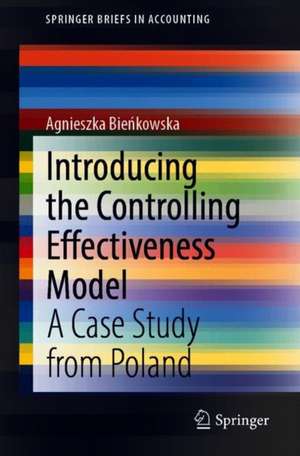Introducing the Controlling Effectiveness Model: A Case Study from Poland: SpringerBriefs in Accounting
Autor Agnieszka Bieńkowskaen Limba Engleză Paperback – 14 mai 2021
The book describes the influence of each identified group of conditions on the Controlling Effectiveness Model and includes empirical research, conducted at various organizations operating in Poland, that verifies its theoretical assumptions. In terms of analyzing the empirical data, description and statistical inference methods were used, such as students’ t-test scores for independent samples, non-parametric r-Pearson correlation and linear regression analysis. Additionally, the book includes moderators and mediators executed using Process Macro for SPSS by Hayes, and multigroup path analysis executed using SPSS AMOS.
Preț: 377.73 lei
Nou
Puncte Express: 567
Preț estimativ în valută:
72.29€ • 78.49$ • 60.72£
72.29€ • 78.49$ • 60.72£
Carte tipărită la comandă
Livrare economică 22 aprilie-06 mai
Preluare comenzi: 021 569.72.76
Specificații
ISBN-13: 9783030738075
ISBN-10: 3030738078
Pagini: 104
Ilustrații: VII, 104 p. 9 illus., 7 illus. in color.
Dimensiuni: 155 x 235 mm
Greutate: 0.17 kg
Ediția:1st ed. 2021
Editura: Springer International Publishing
Colecția Springer
Seria SpringerBriefs in Accounting
Locul publicării:Cham, Switzerland
ISBN-10: 3030738078
Pagini: 104
Ilustrații: VII, 104 p. 9 illus., 7 illus. in color.
Dimensiuni: 155 x 235 mm
Greutate: 0.17 kg
Ediția:1st ed. 2021
Editura: Springer International Publishing
Colecția Springer
Seria SpringerBriefs in Accounting
Locul publicării:Cham, Switzerland
Cuprins
Chapter 1. Introduction.- Chapter 2. Controlling quality and effectiveness - Controlling Effectiveness Model.- Chapter 3. Factors influencing the functioning of controlling.- Chapter 4. Research methodology.- Chapter 5. Conclusions.
Notă biografică
Agnieszka Bieńkowska is the Vice-Rector of Wrocław University of Science and Technology (Poland) and Professor of WUST at the Faculty of Computer Science and Management, Department of Management Systems and Organizational Development. Her research areas are focused on modern methods of management (especially controlling) and HRM solutions in organizations.
Textul de pe ultima copertă
Focusing on the controlling management method, this book considers the conditions that must be met within a given organization in order for controlling to achieve the desired level of product quality, allowing it to enhance the performance of the organization as a whole.
The book describes the influence of each identified group of conditions on the Controlling Effectiveness Model and includes empirical research, conducted at various organizations operating in Poland, that verifies its theoretical assumptions. In terms of analyzing the empirical data, description and statistical inference methods were used, such as students’ t-test scores for independent samples, non-parametric r-Pearson correlation and linear regression analysis. Additionally, the book includes moderators and mediators executed using Process Macro for SPSS by Hayes, and multigroup path analysis executed using SPSS AMOS.
The book describes the influence of each identified group of conditions on the Controlling Effectiveness Model and includes empirical research, conducted at various organizations operating in Poland, that verifies its theoretical assumptions. In terms of analyzing the empirical data, description and statistical inference methods were used, such as students’ t-test scores for independent samples, non-parametric r-Pearson correlation and linear regression analysis. Additionally, the book includes moderators and mediators executed using Process Macro for SPSS by Hayes, and multigroup path analysis executed using SPSS AMOS.
Caracteristici
Offers a comprehensive analysis of the benefits from using controlling as a management method Includes case studies from Poland Specifies the determinants that allow controlling to have the greatest impact on the performance of the organization Approaches controlling from a theoretical standpoint








